Dichev's Report: 21 Entrepreneurial Ventures, Unit 9, New Moon Company
VerifiedAdded on 2022/03/28
|26
|6981
|27
Report
AI Summary
This report, prepared by Dicho Nikolaev Dichev, provides a comprehensive analysis of 21 entrepreneurial ventures, focusing on their types, similarities, and differences. It explores various entrepreneurial models, including survival, lifestyle, scalable, social, e-pruner, and corporate ventures. The report examines the characteristics of successful entrepreneurs and the growth and development of entrepreneurial ventures, emphasizing the importance of small businesses in economic growth. It discusses the role of the New Moon Company in supporting start-up communities and provides insights into the relationships between different venture types and entrepreneurship typologies. The report also highlights the differences in execution between independent and corporate start-ups and concludes with a discussion of the ventures related to public and corporate sectors.

Dicho Nikolaev Dichev
Table of Contents
INTRODUCTION 03
ACTIVITY 1
P1 SIMILARITIES AND DIFFERENCES OF ENTREPRENURES 04
P2 TYPES OF ENTRPERENURE
06
P3 SCOPE AND DEVELOPMENT 08
P4 IMPORTANCE OF SMALL BUSINESS 10
ACTIVITY 2 12
P4 COMPARISON OF SUCCESSFUL COMPANIES
P5ENTREPRENEUR PERSONALITY
P6 POSITIVE AND NEGATIVE NOTE 16
21
Entrepreneurial Ventures
UNIT 9
Table of Contents
INTRODUCTION 03
ACTIVITY 1
P1 SIMILARITIES AND DIFFERENCES OF ENTREPRENURES 04
P2 TYPES OF ENTRPERENURE
06
P3 SCOPE AND DEVELOPMENT 08
P4 IMPORTANCE OF SMALL BUSINESS 10
ACTIVITY 2 12
P4 COMPARISON OF SUCCESSFUL COMPANIES
P5ENTREPRENEUR PERSONALITY
P6 POSITIVE AND NEGATIVE NOTE 16
21
Entrepreneurial Ventures
UNIT 9
Paraphrase This Document
Need a fresh take? Get an instant paraphrase of this document with our AI Paraphraser
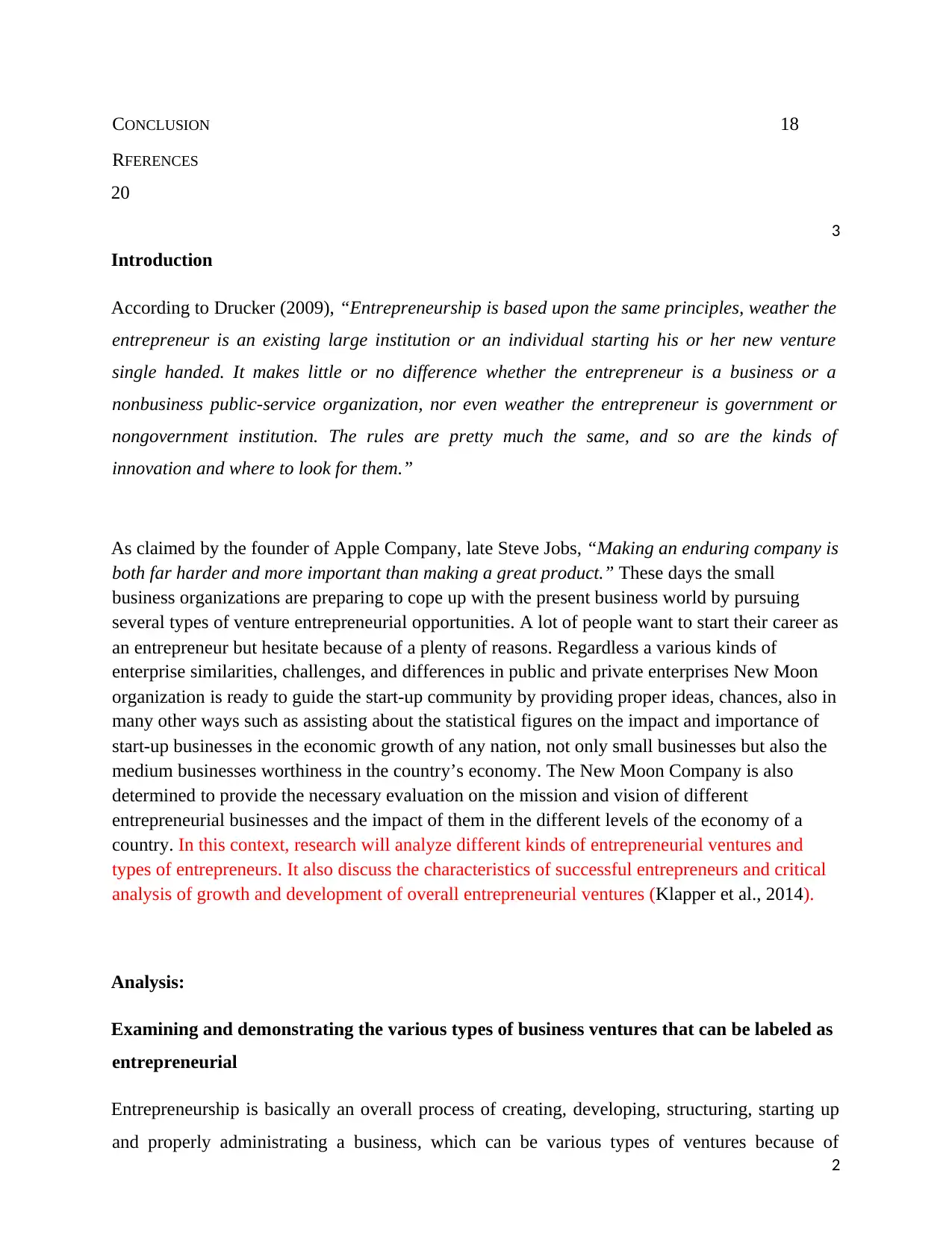
CONCLUSION 18
RFERENCES
20
3
Introduction
According to Drucker (2009), “Entrepreneurship is based upon the same principles, weather the
entrepreneur is an existing large institution or an individual starting his or her new venture
single handed. It makes little or no difference whether the entrepreneur is a business or a
nonbusiness public-service organization, nor even weather the entrepreneur is government or
nongovernment institution. The rules are pretty much the same, and so are the kinds of
innovation and where to look for them.”
As claimed by the founder of Apple Company, late Steve Jobs, “Making an enduring company is
both far harder and more important than making a great product.” These days the small
business organizations are preparing to cope up with the present business world by pursuing
several types of venture entrepreneurial opportunities. A lot of people want to start their career as
an entrepreneur but hesitate because of a plenty of reasons. Regardless a various kinds of
enterprise similarities, challenges, and differences in public and private enterprises New Moon
organization is ready to guide the start-up community by providing proper ideas, chances, also in
many other ways such as assisting about the statistical figures on the impact and importance of
start-up businesses in the economic growth of any nation, not only small businesses but also the
medium businesses worthiness in the country’s economy. The New Moon Company is also
determined to provide the necessary evaluation on the mission and vision of different
entrepreneurial businesses and the impact of them in the different levels of the economy of a
country. In this context, research will analyze different kinds of entrepreneurial ventures and
types of entrepreneurs. It also discuss the characteristics of successful entrepreneurs and critical
analysis of growth and development of overall entrepreneurial ventures (Klapper et al., 2014).
Analysis:
Examining and demonstrating the various types of business ventures that can be labeled as
entrepreneurial
Entrepreneurship is basically an overall process of creating, developing, structuring, starting up
and properly administrating a business, which can be various types of ventures because of
2
RFERENCES
20
3
Introduction
According to Drucker (2009), “Entrepreneurship is based upon the same principles, weather the
entrepreneur is an existing large institution or an individual starting his or her new venture
single handed. It makes little or no difference whether the entrepreneur is a business or a
nonbusiness public-service organization, nor even weather the entrepreneur is government or
nongovernment institution. The rules are pretty much the same, and so are the kinds of
innovation and where to look for them.”
As claimed by the founder of Apple Company, late Steve Jobs, “Making an enduring company is
both far harder and more important than making a great product.” These days the small
business organizations are preparing to cope up with the present business world by pursuing
several types of venture entrepreneurial opportunities. A lot of people want to start their career as
an entrepreneur but hesitate because of a plenty of reasons. Regardless a various kinds of
enterprise similarities, challenges, and differences in public and private enterprises New Moon
organization is ready to guide the start-up community by providing proper ideas, chances, also in
many other ways such as assisting about the statistical figures on the impact and importance of
start-up businesses in the economic growth of any nation, not only small businesses but also the
medium businesses worthiness in the country’s economy. The New Moon Company is also
determined to provide the necessary evaluation on the mission and vision of different
entrepreneurial businesses and the impact of them in the different levels of the economy of a
country. In this context, research will analyze different kinds of entrepreneurial ventures and
types of entrepreneurs. It also discuss the characteristics of successful entrepreneurs and critical
analysis of growth and development of overall entrepreneurial ventures (Klapper et al., 2014).
Analysis:
Examining and demonstrating the various types of business ventures that can be labeled as
entrepreneurial
Entrepreneurship is basically an overall process of creating, developing, structuring, starting up
and properly administrating a business, which can be various types of ventures because of
2

people’s different types of mission and vision. When someone initiates planning a business
structure, the variety depends a lot on their own personality, skills and dreams. There are people
who believe in their own hard work and on the other hand some might have strong capital to help
structure, the variety depends a lot on their own personality, skills and dreams. There are people
who believe in their own hard work and on the other hand some might have strong capital to help
⊘ This is a preview!⊘
Do you want full access?
Subscribe today to unlock all pages.

Trusted by 1+ million students worldwide
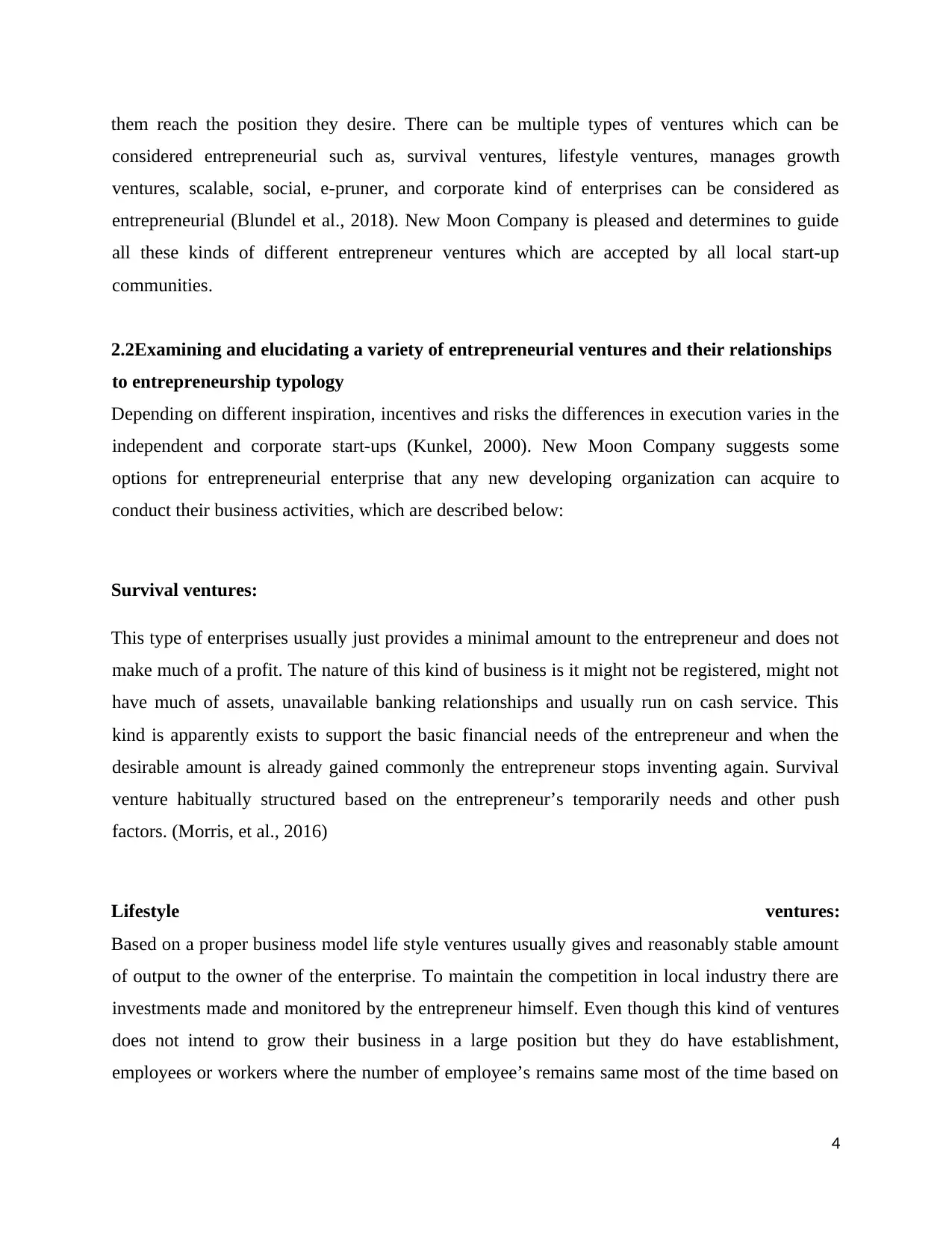
them reach the position they desire. There can be multiple types of ventures which can be
considered entrepreneurial such as, survival ventures, lifestyle ventures, manages growth
ventures, scalable, social, e-pruner, and corporate kind of enterprises can be considered as
entrepreneurial (Blundel et al., 2018). New Moon Company is pleased and determines to guide
all these kinds of different entrepreneur ventures which are accepted by all local start-up
communities.
2.2Examining and elucidating a variety of entrepreneurial ventures and their relationships
to entrepreneurship typology
Depending on different inspiration, incentives and risks the differences in execution varies in the
independent and corporate start-ups (Kunkel, 2000). New Moon Company suggests some
options for entrepreneurial enterprise that any new developing organization can acquire to
conduct their business activities, which are described below:
Survival ventures:
This type of enterprises usually just provides a minimal amount to the entrepreneur and does not
make much of a profit. The nature of this kind of business is it might not be registered, might not
have much of assets, unavailable banking relationships and usually run on cash service. This
kind is apparently exists to support the basic financial needs of the entrepreneur and when the
desirable amount is already gained commonly the entrepreneur stops inventing again. Survival
venture habitually structured based on the entrepreneur’s temporarily needs and other push
factors. (Morris, et al., 2016)
Lifestyle ventures:
Based on a proper business model life style ventures usually gives and reasonably stable amount
of output to the owner of the enterprise. To maintain the competition in local industry there are
investments made and monitored by the entrepreneur himself. Even though this kind of ventures
does not intend to grow their business in a large position but they do have establishment,
employees or workers where the number of employee’s remains same most of the time based on
4
considered entrepreneurial such as, survival ventures, lifestyle ventures, manages growth
ventures, scalable, social, e-pruner, and corporate kind of enterprises can be considered as
entrepreneurial (Blundel et al., 2018). New Moon Company is pleased and determines to guide
all these kinds of different entrepreneur ventures which are accepted by all local start-up
communities.
2.2Examining and elucidating a variety of entrepreneurial ventures and their relationships
to entrepreneurship typology
Depending on different inspiration, incentives and risks the differences in execution varies in the
independent and corporate start-ups (Kunkel, 2000). New Moon Company suggests some
options for entrepreneurial enterprise that any new developing organization can acquire to
conduct their business activities, which are described below:
Survival ventures:
This type of enterprises usually just provides a minimal amount to the entrepreneur and does not
make much of a profit. The nature of this kind of business is it might not be registered, might not
have much of assets, unavailable banking relationships and usually run on cash service. This
kind is apparently exists to support the basic financial needs of the entrepreneur and when the
desirable amount is already gained commonly the entrepreneur stops inventing again. Survival
venture habitually structured based on the entrepreneur’s temporarily needs and other push
factors. (Morris, et al., 2016)
Lifestyle ventures:
Based on a proper business model life style ventures usually gives and reasonably stable amount
of output to the owner of the enterprise. To maintain the competition in local industry there are
investments made and monitored by the entrepreneur himself. Even though this kind of ventures
does not intend to grow their business in a large position but they do have establishment,
employees or workers where the number of employee’s remains same most of the time based on
4
Paraphrase This Document
Need a fresh take? Get an instant paraphrase of this document with our AI Paraphraser
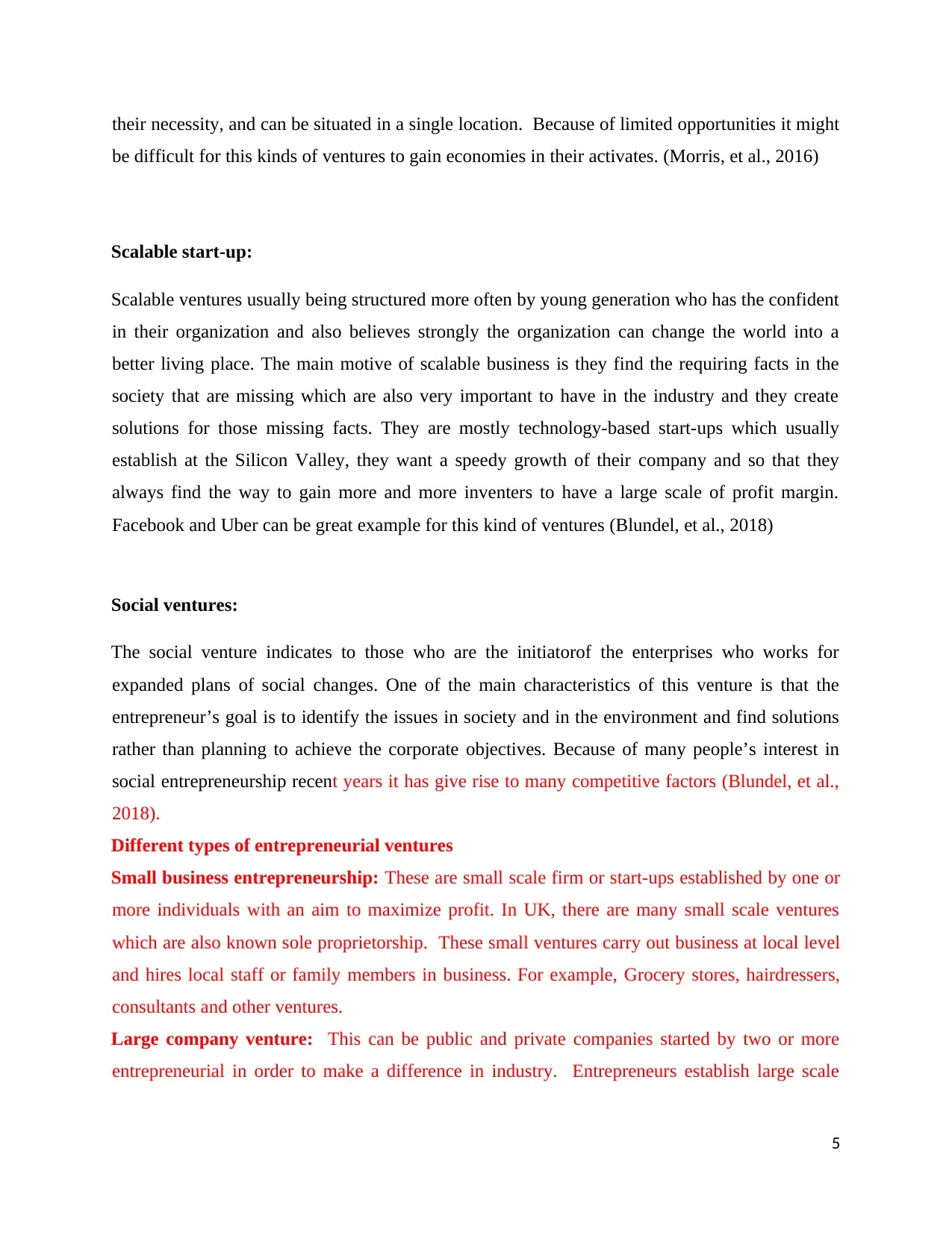
their necessity, and can be situated in a single location. Because of limited opportunities it might
be difficult for this kinds of ventures to gain economies in their activates. (Morris, et al., 2016)
Scalable start-up:
Scalable ventures usually being structured more often by young generation who has the confident
in their organization and also believes strongly the organization can change the world into a
better living place. The main motive of scalable business is they find the requiring facts in the
society that are missing which are also very important to have in the industry and they create
solutions for those missing facts. They are mostly technology-based start-ups which usually
establish at the Silicon Valley, they want a speedy growth of their company and so that they
always find the way to gain more and more inventers to have a large scale of profit margin.
Facebook and Uber can be great example for this kind of ventures (Blundel, et al., 2018)
Social ventures:
The social venture indicates to those who are the initiatorof the enterprises who works for
expanded plans of social changes. One of the main characteristics of this venture is that the
entrepreneur’s goal is to identify the issues in society and in the environment and find solutions
rather than planning to achieve the corporate objectives. Because of many people’s interest in
social entrepreneurship recent years it has give rise to many competitive factors (Blundel, et al.,
2018).
Different types of entrepreneurial ventures
Small business entrepreneurship: These are small scale firm or start-ups established by one or
more individuals with an aim to maximize profit. In UK, there are many small scale ventures
which are also known sole proprietorship. These small ventures carry out business at local level
and hires local staff or family members in business. For example, Grocery stores, hairdressers,
consultants and other ventures.
Large company venture: This can be public and private companies started by two or more
entrepreneurial in order to make a difference in industry. Entrepreneurs establish large scale
5
be difficult for this kinds of ventures to gain economies in their activates. (Morris, et al., 2016)
Scalable start-up:
Scalable ventures usually being structured more often by young generation who has the confident
in their organization and also believes strongly the organization can change the world into a
better living place. The main motive of scalable business is they find the requiring facts in the
society that are missing which are also very important to have in the industry and they create
solutions for those missing facts. They are mostly technology-based start-ups which usually
establish at the Silicon Valley, they want a speedy growth of their company and so that they
always find the way to gain more and more inventers to have a large scale of profit margin.
Facebook and Uber can be great example for this kind of ventures (Blundel, et al., 2018)
Social ventures:
The social venture indicates to those who are the initiatorof the enterprises who works for
expanded plans of social changes. One of the main characteristics of this venture is that the
entrepreneur’s goal is to identify the issues in society and in the environment and find solutions
rather than planning to achieve the corporate objectives. Because of many people’s interest in
social entrepreneurship recent years it has give rise to many competitive factors (Blundel, et al.,
2018).
Different types of entrepreneurial ventures
Small business entrepreneurship: These are small scale firm or start-ups established by one or
more individuals with an aim to maximize profit. In UK, there are many small scale ventures
which are also known sole proprietorship. These small ventures carry out business at local level
and hires local staff or family members in business. For example, Grocery stores, hairdressers,
consultants and other ventures.
Large company venture: This can be public and private companies started by two or more
entrepreneurial in order to make a difference in industry. Entrepreneurs establish large scale
5
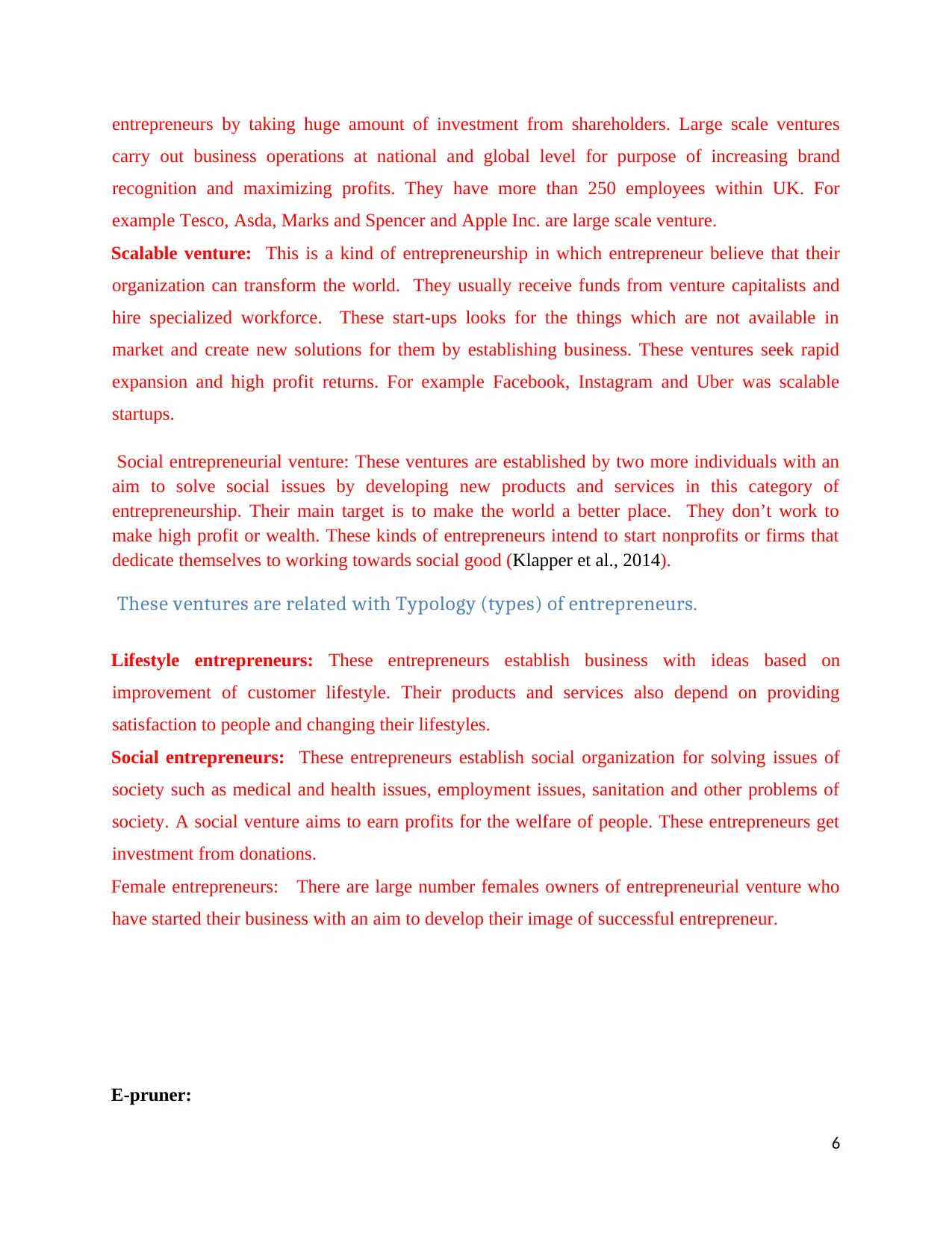
entrepreneurs by taking huge amount of investment from shareholders. Large scale ventures
carry out business operations at national and global level for purpose of increasing brand
recognition and maximizing profits. They have more than 250 employees within UK. For
example Tesco, Asda, Marks and Spencer and Apple Inc. are large scale venture.
Scalable venture: This is a kind of entrepreneurship in which entrepreneur believe that their
organization can transform the world. They usually receive funds from venture capitalists and
hire specialized workforce. These start-ups looks for the things which are not available in
market and create new solutions for them by establishing business. These ventures seek rapid
expansion and high profit returns. For example Facebook, Instagram and Uber was scalable
startups.
Social entrepreneurial venture: These ventures are established by two more individuals with an
aim to solve social issues by developing new products and services in this category of
entrepreneurship. Their main target is to make the world a better place. They don’t work to
make high profit or wealth. These kinds of entrepreneurs intend to start nonprofits or firms that
dedicate themselves to working towards social good (Klapper et al., 2014).
These ventures are related with Typology (types) of entrepreneurs.
Lifestyle entrepreneurs: These entrepreneurs establish business with ideas based on
improvement of customer lifestyle. Their products and services also depend on providing
satisfaction to people and changing their lifestyles.
Social entrepreneurs: These entrepreneurs establish social organization for solving issues of
society such as medical and health issues, employment issues, sanitation and other problems of
society. A social venture aims to earn profits for the welfare of people. These entrepreneurs get
investment from donations.
Female entrepreneurs: There are large number females owners of entrepreneurial venture who
have started their business with an aim to develop their image of successful entrepreneur.
E-pruner:
6
carry out business operations at national and global level for purpose of increasing brand
recognition and maximizing profits. They have more than 250 employees within UK. For
example Tesco, Asda, Marks and Spencer and Apple Inc. are large scale venture.
Scalable venture: This is a kind of entrepreneurship in which entrepreneur believe that their
organization can transform the world. They usually receive funds from venture capitalists and
hire specialized workforce. These start-ups looks for the things which are not available in
market and create new solutions for them by establishing business. These ventures seek rapid
expansion and high profit returns. For example Facebook, Instagram and Uber was scalable
startups.
Social entrepreneurial venture: These ventures are established by two more individuals with an
aim to solve social issues by developing new products and services in this category of
entrepreneurship. Their main target is to make the world a better place. They don’t work to
make high profit or wealth. These kinds of entrepreneurs intend to start nonprofits or firms that
dedicate themselves to working towards social good (Klapper et al., 2014).
These ventures are related with Typology (types) of entrepreneurs.
Lifestyle entrepreneurs: These entrepreneurs establish business with ideas based on
improvement of customer lifestyle. Their products and services also depend on providing
satisfaction to people and changing their lifestyles.
Social entrepreneurs: These entrepreneurs establish social organization for solving issues of
society such as medical and health issues, employment issues, sanitation and other problems of
society. A social venture aims to earn profits for the welfare of people. These entrepreneurs get
investment from donations.
Female entrepreneurs: There are large number females owners of entrepreneurial venture who
have started their business with an aim to develop their image of successful entrepreneur.
E-pruner:
6
⊘ This is a preview!⊘
Do you want full access?
Subscribe today to unlock all pages.

Trusted by 1+ million students worldwide
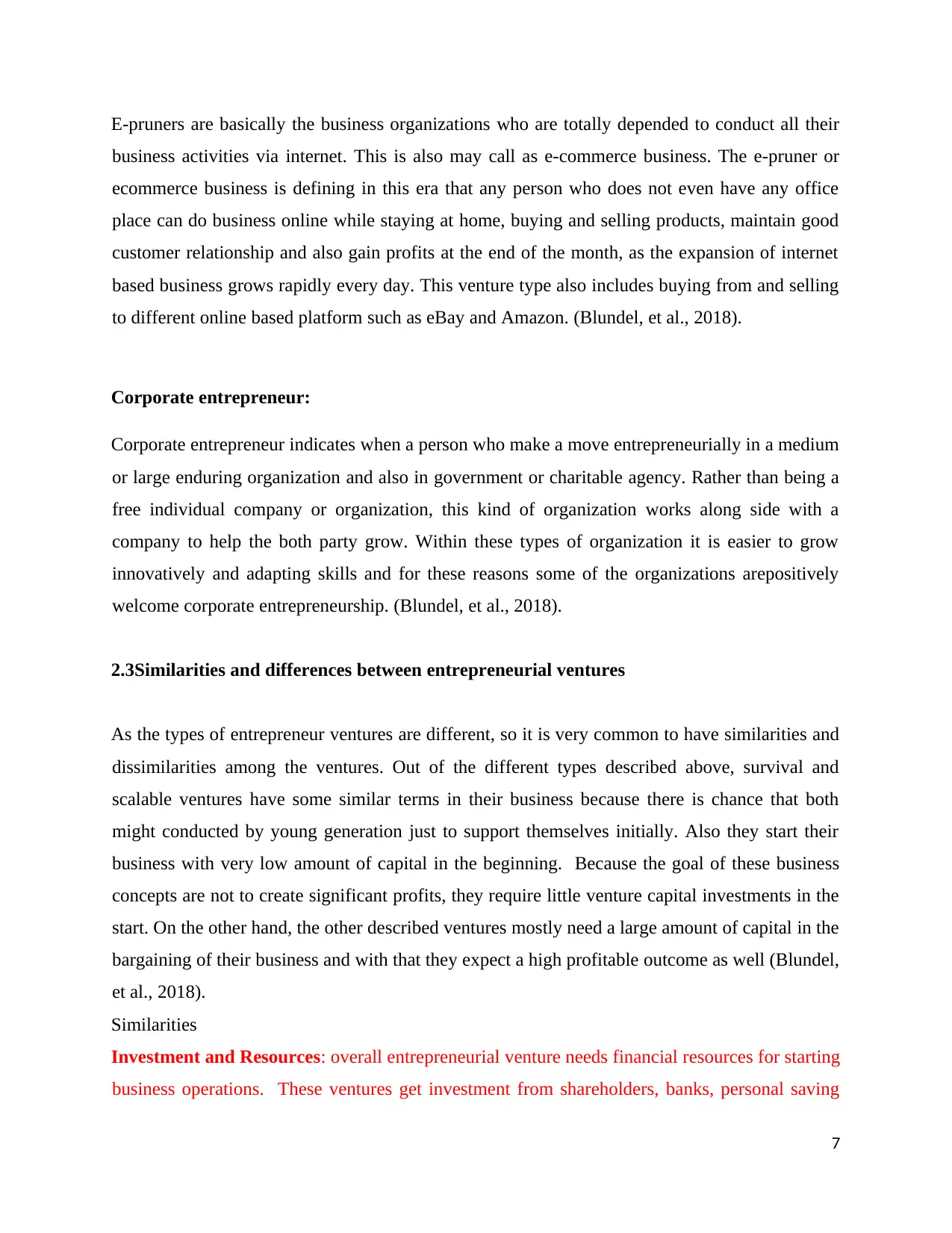
E-pruners are basically the business organizations who are totally depended to conduct all their
business activities via internet. This is also may call as e-commerce business. The e-pruner or
ecommerce business is defining in this era that any person who does not even have any office
place can do business online while staying at home, buying and selling products, maintain good
customer relationship and also gain profits at the end of the month, as the expansion of internet
based business grows rapidly every day. This venture type also includes buying from and selling
to different online based platform such as eBay and Amazon. (Blundel, et al., 2018).
Corporate entrepreneur:
Corporate entrepreneur indicates when a person who make a move entrepreneurially in a medium
or large enduring organization and also in government or charitable agency. Rather than being a
free individual company or organization, this kind of organization works along side with a
company to help the both party grow. Within these types of organization it is easier to grow
innovatively and adapting skills and for these reasons some of the organizations arepositively
welcome corporate entrepreneurship. (Blundel, et al., 2018).
2.3Similarities and differences between entrepreneurial ventures
As the types of entrepreneur ventures are different, so it is very common to have similarities and
dissimilarities among the ventures. Out of the different types described above, survival and
scalable ventures have some similar terms in their business because there is chance that both
might conducted by young generation just to support themselves initially. Also they start their
business with very low amount of capital in the beginning. Because the goal of these business
concepts are not to create significant profits, they require little venture capital investments in the
start. On the other hand, the other described ventures mostly need a large amount of capital in the
bargaining of their business and with that they expect a high profitable outcome as well (Blundel,
et al., 2018).
Similarities
Investment and Resources: overall entrepreneurial venture needs financial resources for starting
business operations. These ventures get investment from shareholders, banks, personal saving
7
business activities via internet. This is also may call as e-commerce business. The e-pruner or
ecommerce business is defining in this era that any person who does not even have any office
place can do business online while staying at home, buying and selling products, maintain good
customer relationship and also gain profits at the end of the month, as the expansion of internet
based business grows rapidly every day. This venture type also includes buying from and selling
to different online based platform such as eBay and Amazon. (Blundel, et al., 2018).
Corporate entrepreneur:
Corporate entrepreneur indicates when a person who make a move entrepreneurially in a medium
or large enduring organization and also in government or charitable agency. Rather than being a
free individual company or organization, this kind of organization works along side with a
company to help the both party grow. Within these types of organization it is easier to grow
innovatively and adapting skills and for these reasons some of the organizations arepositively
welcome corporate entrepreneurship. (Blundel, et al., 2018).
2.3Similarities and differences between entrepreneurial ventures
As the types of entrepreneur ventures are different, so it is very common to have similarities and
dissimilarities among the ventures. Out of the different types described above, survival and
scalable ventures have some similar terms in their business because there is chance that both
might conducted by young generation just to support themselves initially. Also they start their
business with very low amount of capital in the beginning. Because the goal of these business
concepts are not to create significant profits, they require little venture capital investments in the
start. On the other hand, the other described ventures mostly need a large amount of capital in the
bargaining of their business and with that they expect a high profitable outcome as well (Blundel,
et al., 2018).
Similarities
Investment and Resources: overall entrepreneurial venture needs financial resources for starting
business operations. These ventures get investment from shareholders, banks, personal saving
7
Paraphrase This Document
Need a fresh take? Get an instant paraphrase of this document with our AI Paraphraser
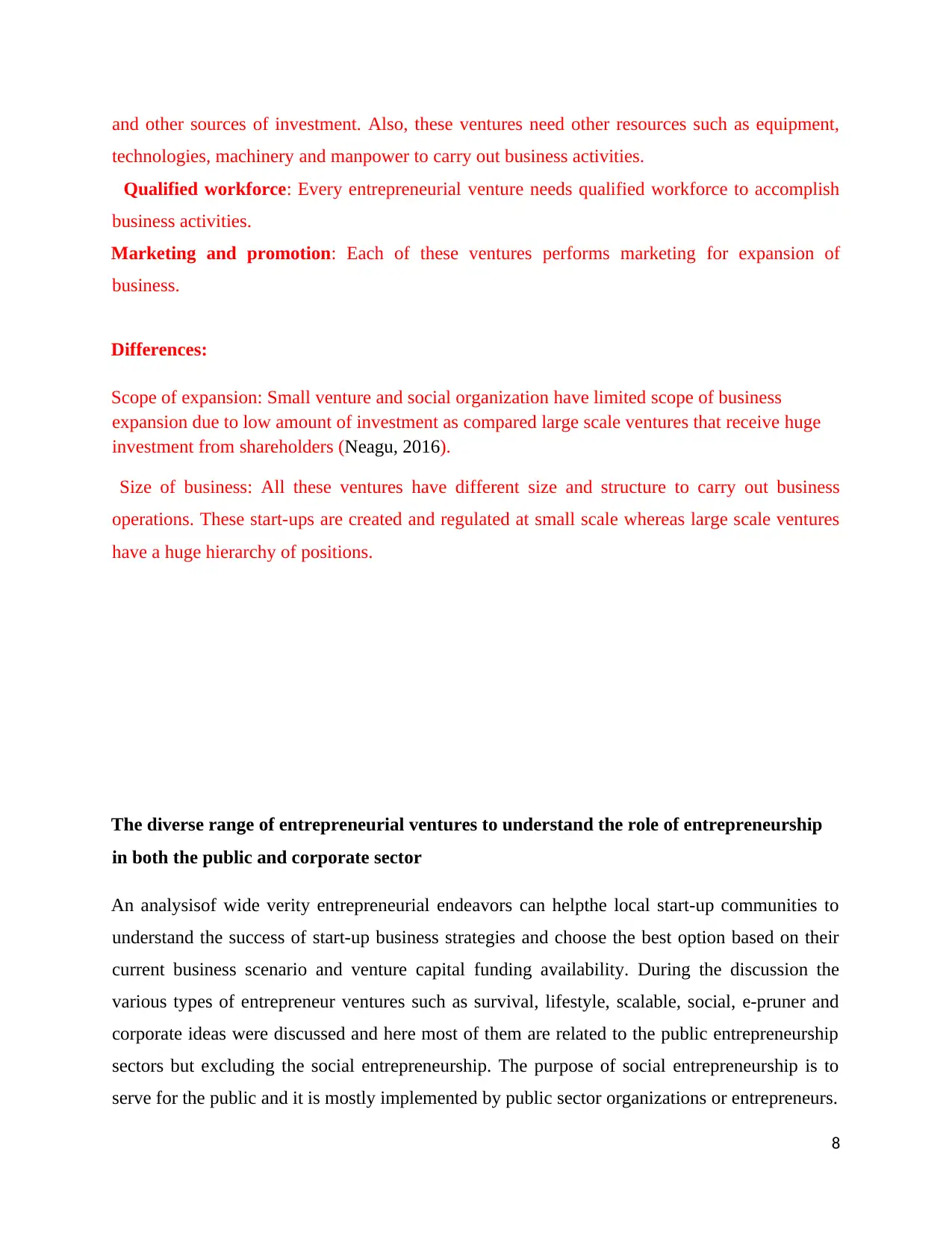
and other sources of investment. Also, these ventures need other resources such as equipment,
technologies, machinery and manpower to carry out business activities.
Qualified workforce: Every entrepreneurial venture needs qualified workforce to accomplish
business activities.
Marketing and promotion: Each of these ventures performs marketing for expansion of
business.
Differences:
Scope of expansion: Small venture and social organization have limited scope of business
expansion due to low amount of investment as compared large scale ventures that receive huge
investment from shareholders (Neagu, 2016).
Size of business: All these ventures have different size and structure to carry out business
operations. These start-ups are created and regulated at small scale whereas large scale ventures
have a huge hierarchy of positions.
The diverse range of entrepreneurial ventures to understand the role of entrepreneurship
in both the public and corporate sector
An analysisof wide verity entrepreneurial endeavors can helpthe local start-up communities to
understand the success of start-up business strategies and choose the best option based on their
current business scenario and venture capital funding availability. During the discussion the
various types of entrepreneur ventures such as survival, lifestyle, scalable, social, e-pruner and
corporate ideas were discussed and here most of them are related to the public entrepreneurship
sectors but excluding the social entrepreneurship. The purpose of social entrepreneurship is to
serve for the public and it is mostly implemented by public sector organizations or entrepreneurs.
8
technologies, machinery and manpower to carry out business activities.
Qualified workforce: Every entrepreneurial venture needs qualified workforce to accomplish
business activities.
Marketing and promotion: Each of these ventures performs marketing for expansion of
business.
Differences:
Scope of expansion: Small venture and social organization have limited scope of business
expansion due to low amount of investment as compared large scale ventures that receive huge
investment from shareholders (Neagu, 2016).
Size of business: All these ventures have different size and structure to carry out business
operations. These start-ups are created and regulated at small scale whereas large scale ventures
have a huge hierarchy of positions.
The diverse range of entrepreneurial ventures to understand the role of entrepreneurship
in both the public and corporate sector
An analysisof wide verity entrepreneurial endeavors can helpthe local start-up communities to
understand the success of start-up business strategies and choose the best option based on their
current business scenario and venture capital funding availability. During the discussion the
various types of entrepreneur ventures such as survival, lifestyle, scalable, social, e-pruner and
corporate ideas were discussed and here most of them are related to the public entrepreneurship
sectors but excluding the social entrepreneurship. The purpose of social entrepreneurship is to
serve for the public and it is mostly implemented by public sector organizations or entrepreneurs.
8
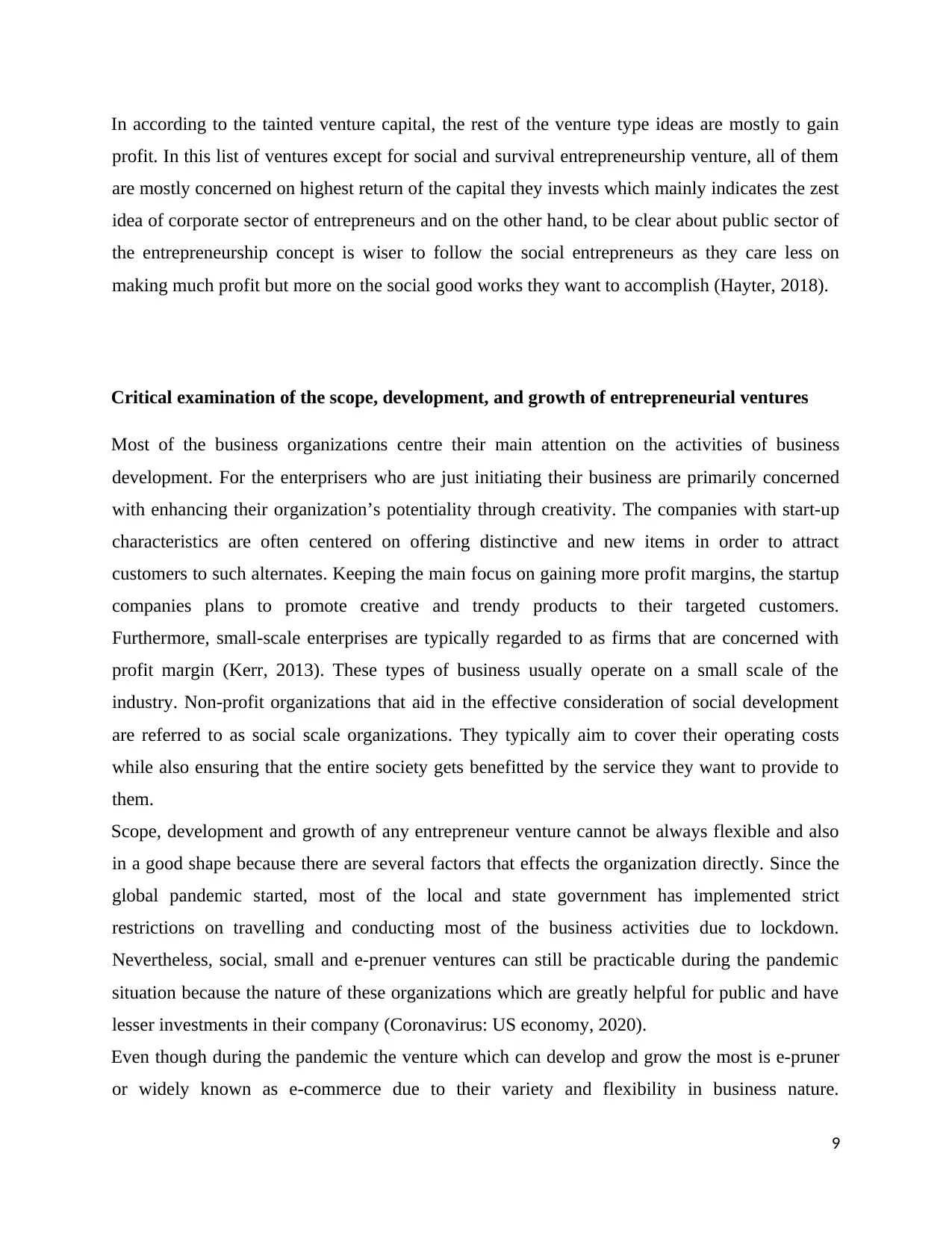
In according to the tainted venture capital, the rest of the venture type ideas are mostly to gain
profit. In this list of ventures except for social and survival entrepreneurship venture, all of them
are mostly concerned on highest return of the capital they invests which mainly indicates the zest
idea of corporate sector of entrepreneurs and on the other hand, to be clear about public sector of
the entrepreneurship concept is wiser to follow the social entrepreneurs as they care less on
making much profit but more on the social good works they want to accomplish (Hayter, 2018).
Critical examination of the scope, development, and growth of entrepreneurial ventures
Most of the business organizations centre their main attention on the activities of business
development. For the enterprisers who are just initiating their business are primarily concerned
with enhancing their organization’s potentiality through creativity. The companies with start-up
characteristics are often centered on offering distinctive and new items in order to attract
customers to such alternates. Keeping the main focus on gaining more profit margins, the startup
companies plans to promote creative and trendy products to their targeted customers.
Furthermore, small-scale enterprises are typically regarded to as firms that are concerned with
profit margin (Kerr, 2013). These types of business usually operate on a small scale of the
industry. Non-profit organizations that aid in the effective consideration of social development
are referred to as social scale organizations. They typically aim to cover their operating costs
while also ensuring that the entire society gets benefitted by the service they want to provide to
them.
Scope, development and growth of any entrepreneur venture cannot be always flexible and also
in a good shape because there are several factors that effects the organization directly. Since the
global pandemic started, most of the local and state government has implemented strict
restrictions on travelling and conducting most of the business activities due to lockdown.
Nevertheless, social, small and e-prenuer ventures can still be practicable during the pandemic
situation because the nature of these organizations which are greatly helpful for public and have
lesser investments in their company (Coronavirus: US economy, 2020).
Even though during the pandemic the venture which can develop and grow the most is e-pruner
or widely known as e-commerce due to their variety and flexibility in business nature.
9
profit. In this list of ventures except for social and survival entrepreneurship venture, all of them
are mostly concerned on highest return of the capital they invests which mainly indicates the zest
idea of corporate sector of entrepreneurs and on the other hand, to be clear about public sector of
the entrepreneurship concept is wiser to follow the social entrepreneurs as they care less on
making much profit but more on the social good works they want to accomplish (Hayter, 2018).
Critical examination of the scope, development, and growth of entrepreneurial ventures
Most of the business organizations centre their main attention on the activities of business
development. For the enterprisers who are just initiating their business are primarily concerned
with enhancing their organization’s potentiality through creativity. The companies with start-up
characteristics are often centered on offering distinctive and new items in order to attract
customers to such alternates. Keeping the main focus on gaining more profit margins, the startup
companies plans to promote creative and trendy products to their targeted customers.
Furthermore, small-scale enterprises are typically regarded to as firms that are concerned with
profit margin (Kerr, 2013). These types of business usually operate on a small scale of the
industry. Non-profit organizations that aid in the effective consideration of social development
are referred to as social scale organizations. They typically aim to cover their operating costs
while also ensuring that the entire society gets benefitted by the service they want to provide to
them.
Scope, development and growth of any entrepreneur venture cannot be always flexible and also
in a good shape because there are several factors that effects the organization directly. Since the
global pandemic started, most of the local and state government has implemented strict
restrictions on travelling and conducting most of the business activities due to lockdown.
Nevertheless, social, small and e-prenuer ventures can still be practicable during the pandemic
situation because the nature of these organizations which are greatly helpful for public and have
lesser investments in their company (Coronavirus: US economy, 2020).
Even though during the pandemic the venture which can develop and grow the most is e-pruner
or widely known as e-commerce due to their variety and flexibility in business nature.
9
⊘ This is a preview!⊘
Do you want full access?
Subscribe today to unlock all pages.

Trusted by 1+ million students worldwide
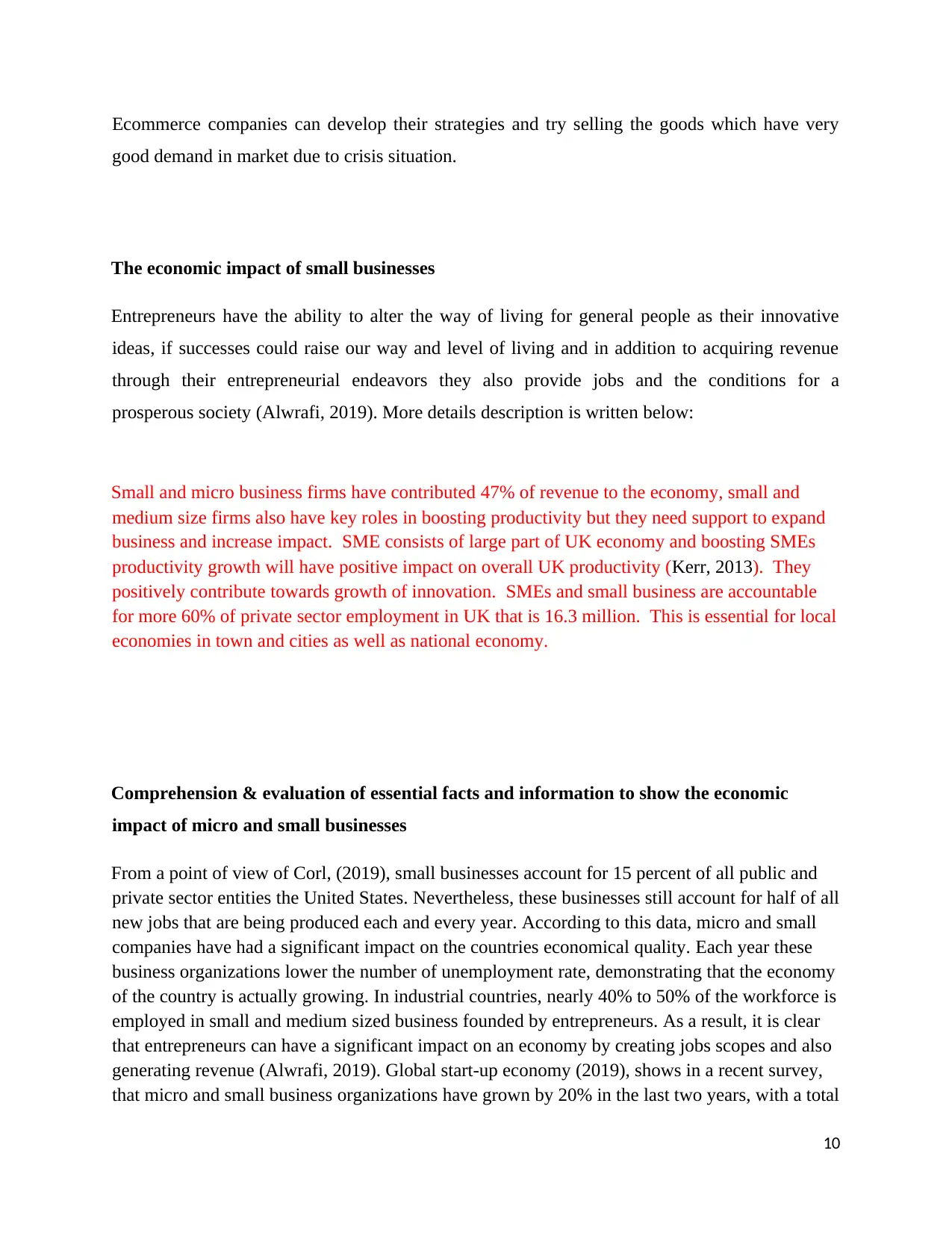
Ecommerce companies can develop their strategies and try selling the goods which have very
good demand in market due to crisis situation.
The economic impact of small businesses
Entrepreneurs have the ability to alter the way of living for general people as their innovative
ideas, if successes could raise our way and level of living and in addition to acquiring revenue
through their entrepreneurial endeavors they also provide jobs and the conditions for a
prosperous society (Alwrafi, 2019). More details description is written below:
Small and micro business firms have contributed 47% of revenue to the economy, small and
medium size firms also have key roles in boosting productivity but they need support to expand
business and increase impact. SME consists of large part of UK economy and boosting SMEs
productivity growth will have positive impact on overall UK productivity (Kerr, 2013). They
positively contribute towards growth of innovation. SMEs and small business are accountable
for more 60% of private sector employment in UK that is 16.3 million. This is essential for local
economies in town and cities as well as national economy.
Comprehension & evaluation of essential facts and information to show the economic
impact of micro and small businesses
From a point of view of Corl, (2019), small businesses account for 15 percent of all public and
private sector entities the United States. Nevertheless, these businesses still account for half of all
new jobs that are being produced each and every year. According to this data, micro and small
companies have had a significant impact on the countries economical quality. Each year these
business organizations lower the number of unemployment rate, demonstrating that the economy
of the country is actually growing. In industrial countries, nearly 40% to 50% of the workforce is
employed in small and medium sized business founded by entrepreneurs. As a result, it is clear
that entrepreneurs can have a significant impact on an economy by creating jobs scopes and also
generating revenue (Alwrafi, 2019). Global start-up economy (2019), shows in a recent survey,
that micro and small business organizations have grown by 20% in the last two years, with a total
10
good demand in market due to crisis situation.
The economic impact of small businesses
Entrepreneurs have the ability to alter the way of living for general people as their innovative
ideas, if successes could raise our way and level of living and in addition to acquiring revenue
through their entrepreneurial endeavors they also provide jobs and the conditions for a
prosperous society (Alwrafi, 2019). More details description is written below:
Small and micro business firms have contributed 47% of revenue to the economy, small and
medium size firms also have key roles in boosting productivity but they need support to expand
business and increase impact. SME consists of large part of UK economy and boosting SMEs
productivity growth will have positive impact on overall UK productivity (Kerr, 2013). They
positively contribute towards growth of innovation. SMEs and small business are accountable
for more 60% of private sector employment in UK that is 16.3 million. This is essential for local
economies in town and cities as well as national economy.
Comprehension & evaluation of essential facts and information to show the economic
impact of micro and small businesses
From a point of view of Corl, (2019), small businesses account for 15 percent of all public and
private sector entities the United States. Nevertheless, these businesses still account for half of all
new jobs that are being produced each and every year. According to this data, micro and small
companies have had a significant impact on the countries economical quality. Each year these
business organizations lower the number of unemployment rate, demonstrating that the economy
of the country is actually growing. In industrial countries, nearly 40% to 50% of the workforce is
employed in small and medium sized business founded by entrepreneurs. As a result, it is clear
that entrepreneurs can have a significant impact on an economy by creating jobs scopes and also
generating revenue (Alwrafi, 2019). Global start-up economy (2019), shows in a recent survey,
that micro and small business organizations have grown by 20% in the last two years, with a total
10
Paraphrase This Document
Need a fresh take? Get an instant paraphrase of this document with our AI Paraphraser
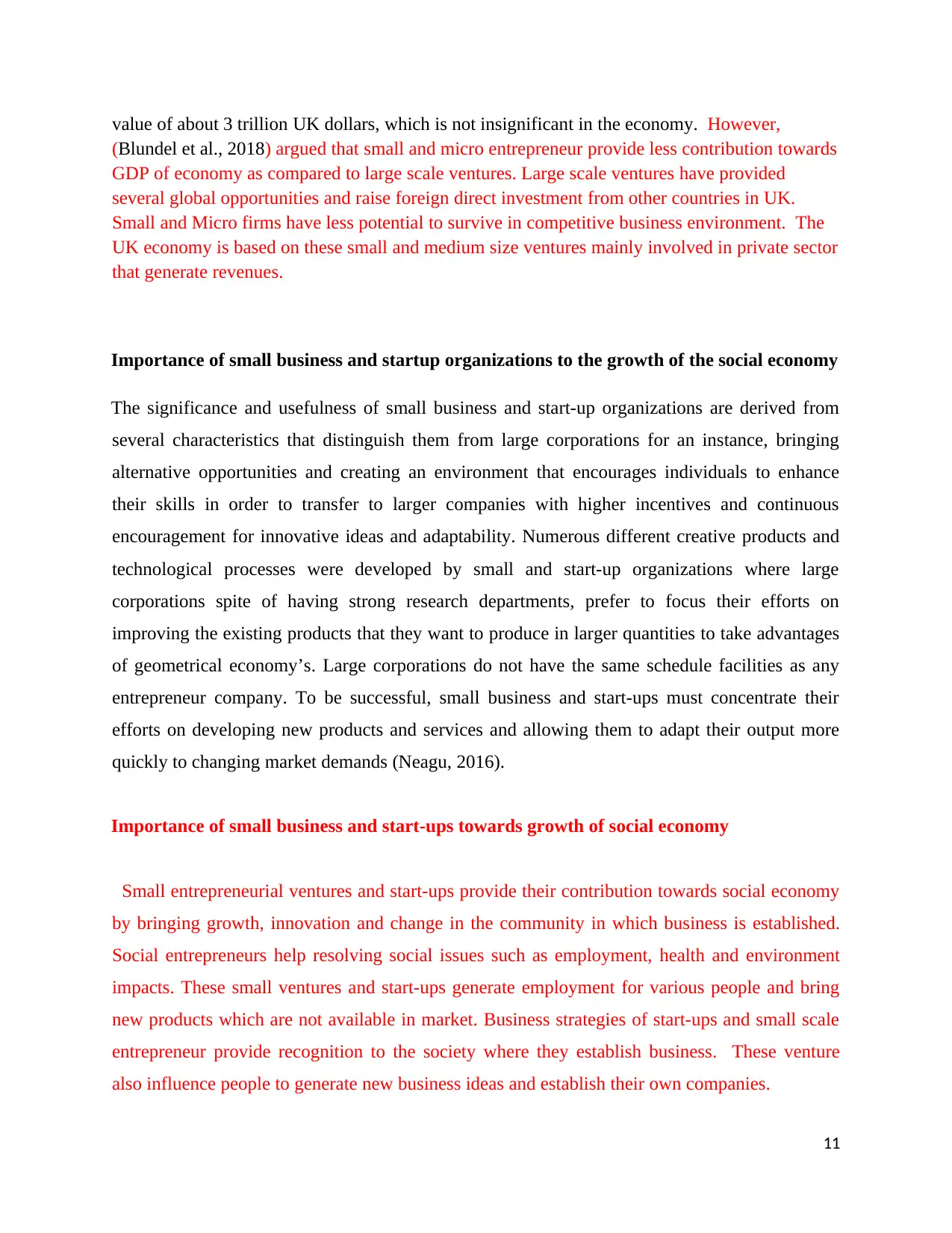
value of about 3 trillion UK dollars, which is not insignificant in the economy. However,
(Blundel et al., 2018) argued that small and micro entrepreneur provide less contribution towards
GDP of economy as compared to large scale ventures. Large scale ventures have provided
several global opportunities and raise foreign direct investment from other countries in UK.
Small and Micro firms have less potential to survive in competitive business environment. The
UK economy is based on these small and medium size ventures mainly involved in private sector
that generate revenues.
Importance of small business and startup organizations to the growth of the social economy
The significance and usefulness of small business and start-up organizations are derived from
several characteristics that distinguish them from large corporations for an instance, bringing
alternative opportunities and creating an environment that encourages individuals to enhance
their skills in order to transfer to larger companies with higher incentives and continuous
encouragement for innovative ideas and adaptability. Numerous different creative products and
technological processes were developed by small and start-up organizations where large
corporations spite of having strong research departments, prefer to focus their efforts on
improving the existing products that they want to produce in larger quantities to take advantages
of geometrical economy’s. Large corporations do not have the same schedule facilities as any
entrepreneur company. To be successful, small business and start-ups must concentrate their
efforts on developing new products and services and allowing them to adapt their output more
quickly to changing market demands (Neagu, 2016).
Importance of small business and start-ups towards growth of social economy
Small entrepreneurial ventures and start-ups provide their contribution towards social economy
by bringing growth, innovation and change in the community in which business is established.
Social entrepreneurs help resolving social issues such as employment, health and environment
impacts. These small ventures and start-ups generate employment for various people and bring
new products which are not available in market. Business strategies of start-ups and small scale
entrepreneur provide recognition to the society where they establish business. These venture
also influence people to generate new business ideas and establish their own companies.
11
(Blundel et al., 2018) argued that small and micro entrepreneur provide less contribution towards
GDP of economy as compared to large scale ventures. Large scale ventures have provided
several global opportunities and raise foreign direct investment from other countries in UK.
Small and Micro firms have less potential to survive in competitive business environment. The
UK economy is based on these small and medium size ventures mainly involved in private sector
that generate revenues.
Importance of small business and startup organizations to the growth of the social economy
The significance and usefulness of small business and start-up organizations are derived from
several characteristics that distinguish them from large corporations for an instance, bringing
alternative opportunities and creating an environment that encourages individuals to enhance
their skills in order to transfer to larger companies with higher incentives and continuous
encouragement for innovative ideas and adaptability. Numerous different creative products and
technological processes were developed by small and start-up organizations where large
corporations spite of having strong research departments, prefer to focus their efforts on
improving the existing products that they want to produce in larger quantities to take advantages
of geometrical economy’s. Large corporations do not have the same schedule facilities as any
entrepreneur company. To be successful, small business and start-ups must concentrate their
efforts on developing new products and services and allowing them to adapt their output more
quickly to changing market demands (Neagu, 2016).
Importance of small business and start-ups towards growth of social economy
Small entrepreneurial ventures and start-ups provide their contribution towards social economy
by bringing growth, innovation and change in the community in which business is established.
Social entrepreneurs help resolving social issues such as employment, health and environment
impacts. These small ventures and start-ups generate employment for various people and bring
new products which are not available in market. Business strategies of start-ups and small scale
entrepreneur provide recognition to the society where they establish business. These venture
also influence people to generate new business ideas and establish their own companies.
11
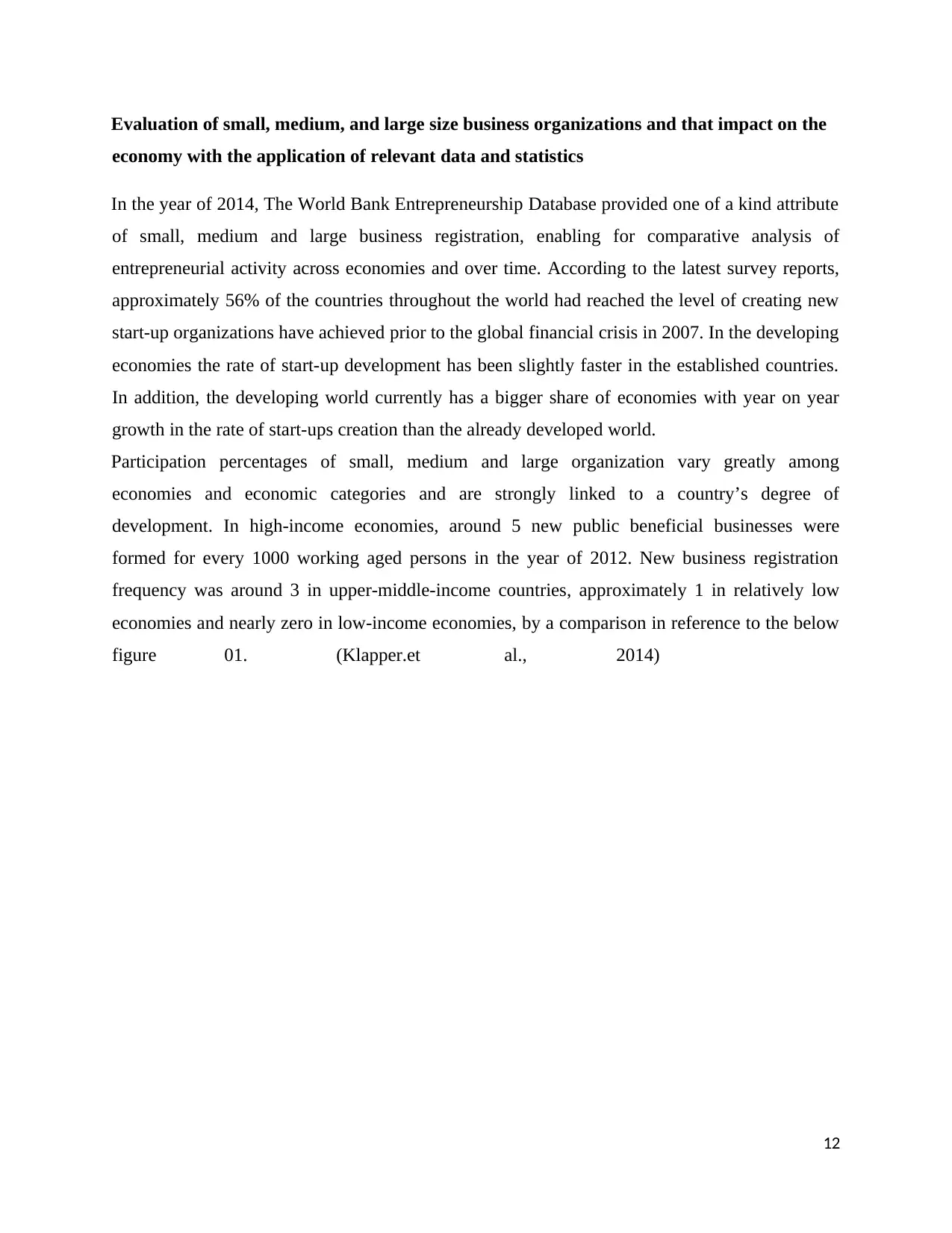
Evaluation of small, medium, and large size business organizations and that impact on the
economy with the application of relevant data and statistics
In the year of 2014, The World Bank Entrepreneurship Database provided one of a kind attribute
of small, medium and large business registration, enabling for comparative analysis of
entrepreneurial activity across economies and over time. According to the latest survey reports,
approximately 56% of the countries throughout the world had reached the level of creating new
start-up organizations have achieved prior to the global financial crisis in 2007. In the developing
economies the rate of start-up development has been slightly faster in the established countries.
In addition, the developing world currently has a bigger share of economies with year on year
growth in the rate of start-ups creation than the already developed world.
Participation percentages of small, medium and large organization vary greatly among
economies and economic categories and are strongly linked to a country’s degree of
development. In high-income economies, around 5 new public beneficial businesses were
formed for every 1000 working aged persons in the year of 2012. New business registration
frequency was around 3 in upper-middle-income countries, approximately 1 in relatively low
economies and nearly zero in low-income economies, by a comparison in reference to the below
figure 01. (Klapper.et al., 2014)
12
economy with the application of relevant data and statistics
In the year of 2014, The World Bank Entrepreneurship Database provided one of a kind attribute
of small, medium and large business registration, enabling for comparative analysis of
entrepreneurial activity across economies and over time. According to the latest survey reports,
approximately 56% of the countries throughout the world had reached the level of creating new
start-up organizations have achieved prior to the global financial crisis in 2007. In the developing
economies the rate of start-up development has been slightly faster in the established countries.
In addition, the developing world currently has a bigger share of economies with year on year
growth in the rate of start-ups creation than the already developed world.
Participation percentages of small, medium and large organization vary greatly among
economies and economic categories and are strongly linked to a country’s degree of
development. In high-income economies, around 5 new public beneficial businesses were
formed for every 1000 working aged persons in the year of 2012. New business registration
frequency was around 3 in upper-middle-income countries, approximately 1 in relatively low
economies and nearly zero in low-income economies, by a comparison in reference to the below
figure 01. (Klapper.et al., 2014)
12
⊘ This is a preview!⊘
Do you want full access?
Subscribe today to unlock all pages.

Trusted by 1+ million students worldwide
1 out of 26
Related Documents
Your All-in-One AI-Powered Toolkit for Academic Success.
+13062052269
info@desklib.com
Available 24*7 on WhatsApp / Email
![[object Object]](/_next/static/media/star-bottom.7253800d.svg)
Unlock your academic potential
Copyright © 2020–2026 A2Z Services. All Rights Reserved. Developed and managed by ZUCOL.





